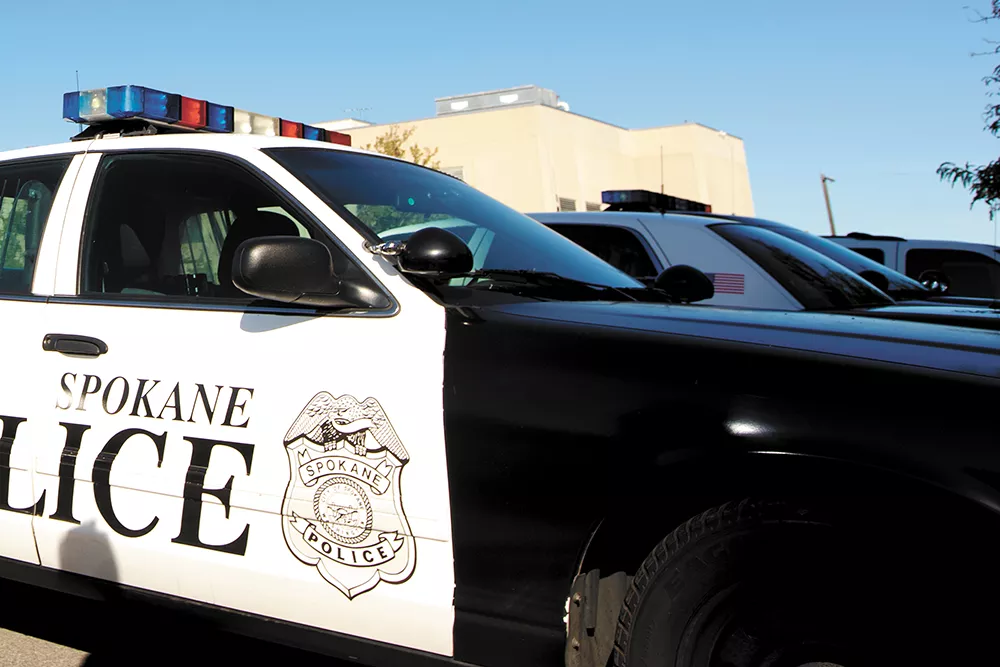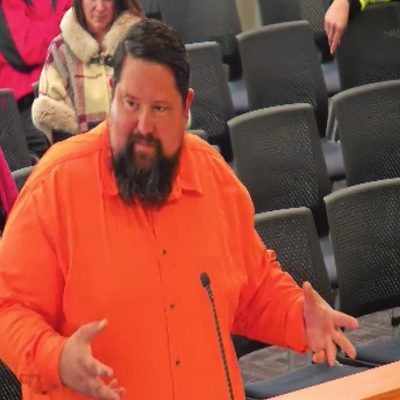Facts should matter to cops, and that's reportedly what sent a longtime Spokane Police detective to a county prosecutor two years ago with concerns that a colleague omitted information from a report documenting a routine traffic stop.
Back in 2017, a confidential informant for Detective Lonnie Tofsrud got pulled over by another Spokane Police officer for driving with a suspended license. However, that second officer had received a tip about the informant carrying illegal firearms before stopping him — a fact that he left out of his report. Ensuing internal investigations eventually landed both Tofsrud and the other officer onto prosecutors' so-called Brady List of investigators whose credibility has officially been called into question.
Now, Tofsrud is asking for $2 million in damages from the city of Spokane, alleging that he was blacklisted by prosecutors, which could affect his career, and retaliated against by the department for speaking up about a fellow cop's conduct.
In a claim filed with the city on March 27, Tofsrud alleges that he was investigated by the department's Internal Affairs unit, reprimanded and eventually placed on the Brady List — all because of his purported desire to correct the record.
"All he did was convey discrepancies to prosecutors," Dan Thenell, a Portland-based attorney representing Tofsrud, tells the Inlander. "Lonnie believed that something was amiss in a criminal case and he went to report it."
The targets of Tofsrud's allegations aren't talking. Spokane Police Chief Craig Meidl declined to comment through Michele Anderson, a department spokeswoman, citing the ongoing litigation. Similarly, Spokane County Prosecutor Larry Haskell also opted not to comment in an email to the Inlander.
It all started with a dispute over how a traffic stop was initiated. On the morning of Nov. 6, 2017, Jeffrey McCollough, a Spokane Police corporal, had received a tip from a confidential informant about a suspect with possible illegal firearms. Then, while checking license plates for stolen cars in a motel parking lot, he discovered that the suspect he'd received a tip about was the registered owner of one of the vehicles and had a suspended license. He eventually pulled him over after the suspect left the motel for the driving-with-a-suspended-license violation; after another officer arrived on the scene, the other officer spotted a "leather ammunition belt" with bullets in the back seat of the car, and found two revolvers after the arrestee allegedly consented to a vehicle search. The suspect was subsequently charged with two counts of unlawful possession of a firearm and booked into jail.
But McCollough's police report never mentioned the fact that he received a tip from a confidential informant. On paper, McCollough's report made the stop look like it was strictly because of the status of the arrestee's license. This discrepancy was allegedly the sticking point for Tofsrud.
As it turned out, the arrestee was an informant for Tofsrud. McCollough informed Tofsrud of the arrest since they were detaining his informant. After comparing McCollough's personally written narrative and the computer-generated dispatch report for the arrest, Tofsrud noticed that McCollough's initial tip wasn't mentioned.
In Tofsrud's view, the omission undermined the probable cause of the traffic stop, while the arrest also threatened the arrestee's role as a confidential informant involved in other cases that he was working.
"McCollough had omitted significant details from his written report that cast serious doubt on the probable cause for the initial traffic stop," Tofsrud's claim reads.
Tofsrud reportedly spoke to McCollough about the discrepancy and told him that he needed to "fix" it, according to Internal Affairs investigation documents obtained by the Inlander. During that conversation, McCollough acknowledged the differences in the reports, and said he'd contact prosecutors about it.
From McCollough's perspective, there wasn't much of an issue to begin with: "I didn't put anything in my report because ... I didn't think it was relevant," McCollough said, according to internal investigation documents. "I stopped this guy for driving suspended ... It's an arrestable offense."
In late December 2017, McCollough called the deputy prosecutor on the case, Eugene Cruz, asking if there would be any problems with the omission. Cruz allegedly said that there wasn't an issue. "He [Cruz] seemed like it was no big deal," McCollough eventually told internal investigators.
What happened next is contested but also key to informing the current legal drama: After Cruz got off the phone with McCollough, Tofsrud allegedly walked into Cruz's office to discuss the report. According to his claim for damages, Tofsrud merely reported the discrepancy between the two reports, rather than alleging any kind of malicious deception on McCollough's part.
"Tofsrud's concern was not to implicate McCollough but to ensure prosecutions based on good probable cause and [to] attempt to salvage his cases which featured the arrestee as a [confidential informant]," Tofsrud's claim reads.
But days later, Cruz sent a memo dated Jan. 2, 2018, to another prosecutor, Jack Driscoll, stating that he'd met with Tofsrud regarding McCollough's report and that the detective thought the corporal was "not being truthful." He also characterized the arrest as a "pretext stop" — a controversial practice where police use minor traffic violations as a pretext to investigate other criminal activity — and that it "should be dismissed." The case was dropped the next day, per court documents.
Pretext stops are on mixed legal footing in Washington state. In 1999, the state Supreme Court ruled that using traffic stops as a pretext for investigating other crimes violated the state constitution. But in a 2012 case, State v. Arreola, the court ruled that pretext stops, otherwise known as mixed-motive stops, are legal so long as a legitimate traffic violation occurred, regardless of the cop's underlying motivations.
"Pretext is essentially dead as a defense in Washington," Brendan Kidd, a local defense attorney, tells the Inlander. "If they would have stopped the vehicle for the underlying violation anyways, and can say that, they can stop [the car] regardless of their actual intent."
As for cops omitting information from reports, Kidd says that while it happens frequently, the significance of what is left out matters a great deal in how a court will view it. "I think it harkens back to what the facts are that are omitted," he says.
Of circumstances like McCollough's omission, Kidd says: "I still don't like it, it feels like there's something being withheld. [But] from a legal perspective, I'm not sure the courts are going to jump up and down and hold it a bad stop."
After prosecutors dropped the case, they requested that the Police Department conduct an internal investigation into McCollough on Jan. 10, 2018, citing the "allegation that Cpl. McCollough may have been untruthful."
But McCollough wasn't the only officer who would end up under a microscope. According to Tofsrud's claim, a "counter-investigation" was initiated by Lt. Dave Staben, who oversees both McCollough and Tofsrud. The inquiry looked at whether Tofsrud violated department policies and ethics, including "knowingly" making false accusations about McCollough.
Both investigations were wrapped up in the summer of 2018. McCollough was exonerated of being deceptive in his paperwork. In contrast, while the department didn't dispute that information was left out of McCollough's report, Tofsrud was still found to have committed a number of violations, including deliberately maligning the reputation of another officer for reportedly telling Cruz that McCollough was effectively lying in his report.
Following the conclusion of the investigations, Chief Meidl also reprimanded Tofsrud in a June 22 letter for going directly to prosecutors with concerns and not keeping the complaint within the department chain-of-command, calling the action "reckless and inappropriate."
Then, in August, Tofsrud received a letter from Mark Cipolla — a senior deputy prosecutor with the county — notifying him that he was being placed on the Brady List. In the letter, Cipolla cited the department's finding that Tofsrud knowingly made false statements about another officer.
Complicating the situation is the fact that McCollough — who Meidl called the "victim" in the situation in a letter to the Spokane Police Guild president — was placed on the Brady List by prosecutors in late January 2019.
In a letter to McCollough, Cipolla cited the department's internal investigation into him and an "affidavit of probable cause in which facts were omitted" stemming from the November 2017 arrest. ♦






















